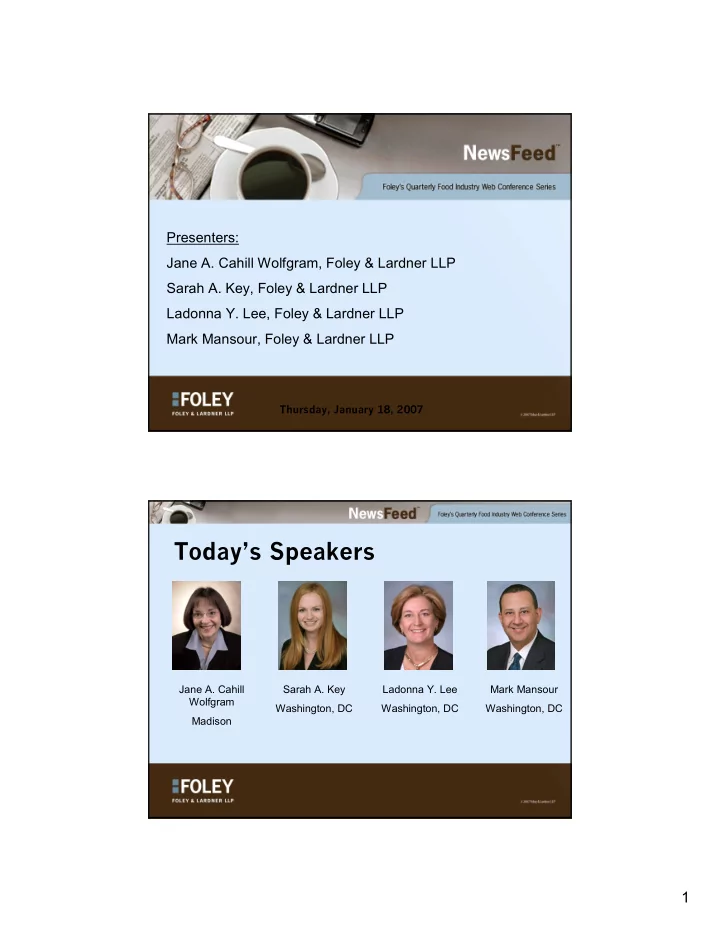

Presenters: Jane A. Cahill Wolfgram, Foley & Lardner LLP Sarah A. Key, Foley & Lardner LLP Ladonna Y. Lee, Foley & Lardner LLP Mark Mansour, Foley & Lardner LLP Thursday, January 18, 2007 Today’s Speakers Jane A. Cahill Sarah A. Key Ladonna Y. Lee Mark Mansour Wolfgram Washington, DC Washington, DC Washington, DC Madison 1
Housekeeping � We will take questions throughout the program via the Q & A box at the bottom of your screen and live questions at the end of the program � Today’s program is being recorded and will be available on Foley’s Web site � Foley will apply for CLE credit after the Web conference. If you did not supply your CLE information upon registration, please e-mail it to mlopez@foley.com The Food Industry: Congressional Agenda 2
Food Safety � E. coli outbreaks � Cloning � Nanotechnology � Healthy “fats” FDA Regulatory � Need for additional funding � Need for additional manpower � Congressional demands for greater oversight � Demands for greater transparency 3
Farm Bill � Subsidies � Food, feed & fuel � Food programs Impacts on Processing and Production Costs � Large scale production practices challenges � Environmental mitigation � Infrastructure and fuel pressures � Container inspection requirements 4
International Market Access Issues Affecting the Food Industry International Market � Over the past 10 years, non-tariff trade barriers have slowly become as important or even more important than tariff barriers in the movement of food around the globe � Many of these barriers are scientific related, and some are based on unsound scientific principles � US manufacturers are often hard hit, as products are stopped, restricted or even banned because of regulations that are not observed in the US (GMOs are an example) 5
International Market (cont’d) � Until the past several years, the US regulatory model was the prevailing model � Recently, the EU precautionary model is more popular among an increasing number of developing country markets, both large and small (China and Japan are examples) � The result is that a complex web of unfamiliar regulations are closely inhibiting US industry’s ability to construct and manage complex and efficient global supply chains International Market (cont’d) � Although Codex Alimentarius has been the means by which industry has been able to develop reliable food standards and guidelines for international trade, the EU’s growing supremacy in Codex., the rise of precaution-based regulation and other organizations such as ISO developing food standards, is causing considerable confusion 6
International Market (cont’d) � Case study: – The EU and GMOs, labeling and dietary supplements International Market (cont’d) � Case study: – Korea and packaged goods re-registration 7
International Market (cont’d) � Case study: – Japan and foods for special dietary uses (nutraceuticals and functional foods) International Market (cont’d) � Concluding observations: – How to manage non-tariff barriers – What is coming next (nanotechnology and EU-driven initiatives) 8
Food Allergens Food Allergen Labeling and Consumer Protection Act of 2004 (FALCPA) FALCPA went into effect on January 1, 2006 � Implements specific requirements for labeling of food products � containing a “major food allergen” Major food allergens are the following: � – Milk – Egg – Fish – Crustacean shellfish – Tree nuts – Wheat – Peanuts – Soybeans 9
Scope of Rule � New allergen labeling requirements apply to all packages foods sold in the United States that are regulated by FDA under the Federal Food, Drug, and Cosmetic Act, as well as foods packaged by a retails or foodservice establishment Implications of New Requirements for Other Segments of Food Industry � Labeling for agriculture commodities or bulk ingredients provided to food processors � Cross contamination � Oils derived from allergens 10
“Gluten-Free” Claims � FALCPA also directed FDA to issue a regulation to define and permit the use of “gluten-free” claims on food labels Enforcement Issues � Since FALCPA went into effect on January 1, 2006, FDA has sent out several Warning Letters to food processors for noncompliance with the labeling requirements 11
Questions & Answers Contact Us Jane A. Cahill Wolfgram Sarah A. Key Public Affairs Director Associate 150 East Gilman St. 3000 K St. NW, Suite 500 Madison, WI 53703 Washington, DC 20007 Tel: 608.258.4270 Tel: 202.295.4720 jcahillwolfgram@foley.com skey@foley.com Ladonna Y. Lee Mark Mansour Strategic Communications Consultant Partner 3000 K St. NW, Suite 500 3000 K St NW, Suite 500 Washington, DC 20007 Washington, DC 20007 Tel: 202.295.4107 Tel: 202.672.5585 llee@foley.com mmansour@foley.com 12
Recommend
More recommend